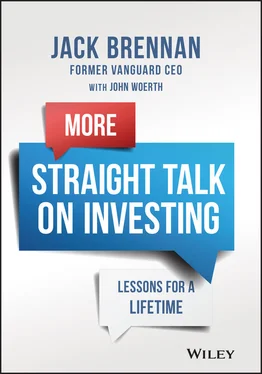For these reasons, I always want to know how a money manager has performed relative to the competition over the full cycle of a bull market and a bear market. An added advantage of experience is that it teaches humility. Investors who have been through up and down cycles tend to avoid overconfidence and are cognizant of risks. Anyone who's been in the financial business for a lengthy period of time has hit some rough patches and does not take lightly the unpredictability of the markets.
So experience is important, but don't let it be the sole factor in your decision. Being the oldest doesn't make a firm the best one, nor should you rule out a young firm purely because of its limited experience. Experience is not a litmus test; it's just a factor to be weighed. Still, if you're thinking of dealing with a small organization that you know little about, it makes sense to seek references from others who have done business with the company.
In any case, you'll also want to request the following information from any provider:
A complete and candid explanation of the costs of the investments and any additional fees you'll be charged.
A clear and comprehensive description of the fund's investment strategy and policies.
A record of the past performance of fund and the background on the managers responsible for producing it.
An explanation of how the performance of your own investments will be reported to you.
These are the questions that any sophisticated investor will ask before hiring an investment firm for a mutual fund, pension fund, endowment, or foundation. They're the questions we always asked at Vanguard before appointing an investment advisor to one of our funds. Whether you're looking for a mutual fund company, a brokerage firm, a robo-advisor, or a financial planner, these questions are as relevant for you as they are for a sizable company like Vanguard.
Once you've selected a trustworthy provider, stay alert for changes in the ownership or leadership of the firm. Rapid turnover of portfolio managers should also trigger some concern. Regulatory actions and security breaches are another red flag.
An important gauge of any company is communications. How frequent? Are they clear and candid? Are they consistent in good markets and bad? Are they selling or telling? Or, better yet, are they contrarian, giving you a dose of reality in times of market ebullience and perspective in seemingly dire days? If you ever have doubts about whether your company is being forthright with you, it's time to switch. Firms deserve to have your money only as long as they deserve your trust.
If you trust in yourself, in the markets, in time, and in your investment provider, you still have to do something else to accumulate investment wealth. You must invest. This seems obvious, but believe me, some would-be investors get stuck in the ready … aim … aim … aim … mode. They never fire because they are always waiting for the right moment to begin investing. They feel considerable envy of those who have invested successfully. But they never take steps to get in the game themselves.
There's a story about a man who prayed night after night, “Dear God, let me win the lottery.” But the man despaired every evening when the winning numbers were announced, and he was not a winner. This went on for many months until one night, as the man was praying for the hundredth time, the heavens opened up and a deep voice boomed: “Meet me halfway. Buy a ticket.”
Trust should give you the courage to take the plunge, secure in the knowledge that you are investing with intelligence and discipline.
Your success as an investor is dependent on knowing whom to trust (and whom not to trust):
Trust yourself to make sound decisions. Don't trust hot tips and sales pitches.
Trust the financial markets to be your partner in accumulating wealth. Despite the short-term ups and downs of the stock market, the strength and resilience of the U.S. economy suggest that long-term investors will continue to be rewarded.
Trust in time. Start early and put the power of compounding to work for you.
Trust a financial provider. Find a trustworthy provider that will serve you with integrity and help you accomplish your financial goals.
3 A Map to Success: Hmm, Sounds Like a Plan
Legendary baseball catcher Yogi Berra once said, “You got to be very careful if you don't know where you're going, because you might not get there.” Although Yogi wasn't likely talking about investing, the quote hits the mitt right on target. Having a plan will help make your financial life less burdensome and more gratifying.
Developing a financial plan need not be complex. It entails looking ahead and assessing where and when your needs for money will occur. Then you decide how you're going to meet those needs. It's essentially a three-step process:
1 Determine how much money you'll need for your goal(s).
2 Determine the mix of investments that should provide you with that targeted amount.
3 Determine how much you need to set aside in order to reach your goals.
If you're like most people, you have more than one investment goal. For nearly all of us, a secure retirement is the largest goal in terms of the amount of money required. It's also the one for which you have the longest time to achieve. But other needs may be more immediately pressing, such as a down payment on a house or a child's college education. In addition to your primary goals, you'll need to have a plan for meeting rainy day needs—the unexpected financial hurdles that life has a way of putting on your path.
In this chapter, I'll share some financial planning tips based on lessons I learned from my own experience and from the thousands of successful investors I've talked to over the years, including the concept of thinking of yourself as a financial entrepreneur.
The Single Most Important Thing to Do
As I noted in Chapter 1, when people ask me how to go about setting up a financial plan, I usually offer them four words of advice: “Live below your means.” Simply put, to live below your means, you must not spend more money than you earn.
Living below your means is the ultimate financial strategy. Actually, it's more—it's a way of life. If you want to be able to invest and accumulate wealth to help yourself or others in the future, you simply cannot spend more than you earn. Living beneath your means and becoming a saver are so critical to your financial success that I'll talk about it here and again in the next chapter. And I'll discuss some tools and techniques to help you do it.
Effective saving isn't just tucking away as much money as you possibly can. It's also knowing where to put your money so that it will earn a reasonable rate of return and be there when you need it.
A friend whose firm is one of Vanguard's large corporate clients frames the concept as follows: “When I'm talking to our employees about the importance of saving and investing, I urge them to think of themselves as ‘personal financial entrepreneurs.' We're all financial entrepreneurs, running our own financial operations, first in our working years and later in retirement.”
As a financial entrepreneur, you'll want to create an income statement . In business, that's a summary of how much profit (or loss) a company had during a certain period of time. For you, it's the same thing. Your personal income statement would list your revenues (e.g., your pay, plus any investment income or gifts you receive) and your costs . The costs would include your fixed expenses (e.g., taxes, mortgage, insurance premiums, student loan payments, car payments, and the like) and your variable expenses (e.g., food, clothing, entertainment, charitable donations, and discretionary items).
Читать дальше












